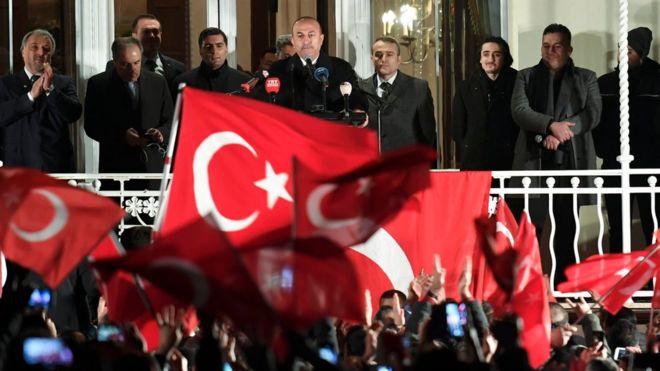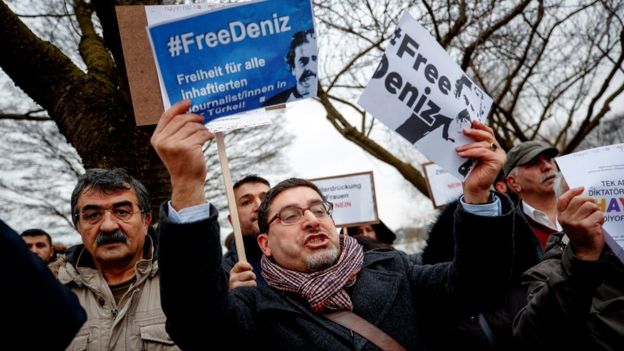Germany warns Turkey over Nazi jibes amid referendum row 9 hours ago From the section Europe Share A view of the Turkish consulate after Foreign Minister Mevlut Cavusoglu spoke to supporters of the upcoming referendum in Turkey on 7 March 2017 in Hamburg, GermanyImage copyrightREUTERS Image caption The Turkish foreign minister (top middle) addressed crowds from Turkish consular residence in Hamburg, after German authorities banned a scheduled rally Comparisons with Nazi Germany are "lines that should not be crossed", the German foreign minister has warned his Turkish counterpart as they met to try to defuse a bitter row. But Sigmar Gabriel also emphasised his wish to return to "friendly relations". President Recep Tayyip Erdogan has accused Germany of "Nazi practices" because of the cancellation of rallies involving Turkish ministers. He is seeking new constitutional powers in a 16 April referendum. Foreign Minister Mevlut Cavusoglu repeated the Nazi comparison on a visit to Hamburg aimed at drumming up support among some of the 1.4m Turkish voters who live in Germany. Turkey's Erdogan makes Nazi jibe over Germany rally ban Turkey says 'No' to saying 'No', ahead of its referendum Why is German-Turkish reporter in detention? German Chancellor Angela Merkel has condemned the Nazi jibe as "unacceptable" and Mr Gabriel echoed her sentiment after a breakfast meeting in Berlin with Mr Cavusoglu. "The Turkish side said it wanted to be treated equally with respect but I believe both sides have a responsibility and there are lines that must not be crossed and any comparison with Nazi Germany is one of them," Mr Gabriel said. But Mr Gabriel was also keen to stress the "success" of the two nations' ties, and stressed his intention to avoid lasting damage to them. Why did Turkey make the Nazi claim? Turkey is targeting millions of its expatriate voters eligible to cast a ballot in the referendum - including 1.4m in Germany. However, German officials have withdrawn permission for rallies in Gaggenau, Cologne and Frechen. In his remarks, Mr Erdogan suggested such a move was anti-democratic, and made his Nazi comparison on those grounds. In response, Germany has insisted such moves are made by city councils, and were largely based on security concerns. Then on Tuesday evening, Mr Cavusoglu accused German authorities of "systematic pressure" on German-based Turks, saying Berlin was intervening in favour of a "no" vote in the referendum. He said Germany should not give Turkey "democracy and human rights lessons". He was speaking from the balcony of Turkey's consular residence in Hamburg after the building originally scheduled for the rally was closed by authorities. Why have relations got so bad? Relations have deteriorated since last July's attempted coup in Turkey. Germany has been critical of the mass arrests and purges that followed - with nearly 100,000 civil servants removed from their posts and academics among the latest. Meanwhile, Turkey has bridled at its perceived lack of support - accusing Germany of foot-dragging in its request for the extradition of people it suspects of being linked to the coup bid. Protesters shout slogans in front of the Turkish Consulate as a protest against the visit of Turkish Foreign Minister Mevlut Cavusoglu in Hamburg, Germany, 7 March 2017Image copyrightEPA Image caption FM Cavusoglu's visit also attracted counter-demonstrations in Germany - with many calling for the release of the Die Welt correspondent detained by Turkey Another contentious subject raised at Wednesday morning's meeting, according to Mr Gabriel, was the fate of Deniz Yucel, a German-Turkish journalist working for Die Welt who has been detained in Turkey for alleged terrorism propaganda. Mr Cavusoglu agreed to give Germany consular access to the reporter, Mr Gabriel said. German-Turkish reporter arrested in Turkey for 'terrorist propaganda' There are irritants that go further back, with Turkey, for instance, accusing Germany of giving a safe haven to Kurdistan Workers' Party (PKK) rebels, which it deems to be terrorists. Such tensions matter because Germany and Turkey are inextricably linked. Some 3m people of Turkish descent live in Germany - many as a result of Germany's "guest worker" (Gastarbeiter) programme in the 1960s and 1970s. What about Turkey's relations with the rest of Europe? Also rocky, in many cases. The Dutch and Austrian governments have also criticised the Turkish government's drive to take its referendum campaign to Turks based in EU countries. Erdogan rallies not welcome in Austria Many European nations have expressed deep disquiet about Turkey's response to the coup attempt and its perceived slide towards authoritarianism under President Erdogan. Turkey is a key partner in an arrangement attempting to limit the movement of migrants into the EU, but has threatened to "open the gates" if the EU reneges on commitments to provide aid, visa-free travel for its nationals and accelerated membership talks. Meanwhile, Russia and Turkey have steadily improved ties as both countries' relations with the EU have cooled.
Germany warns Turkey over Nazi jibes amid referendum row
- http://www.bbc.com
- 9 hours ago
- Europe
 REUTERS
REUTERS
Comparisons with Nazi Germany are "lines that should not be crossed", the German foreign minister has warned his Turkish counterpart as they met to try to defuse a bitter row.
But Sigmar Gabriel also emphasised his wish to return to "friendly relations".
President Recep Tayyip Erdogan has accused Germany of "Nazi practices" because of the cancellation of rallies involving Turkish ministers.
He is seeking new constitutional powers in a 16 April referendum.
Foreign Minister Mevlut Cavusoglu repeated the Nazi comparison on a visit to Hamburg aimed at drumming up support among some of the 1.4m Turkish voters who live in Germany.
- Turkey's Erdogan makes Nazi jibe over Germany rally ban
- Turkey says 'No' to saying 'No', ahead of its referendum
- Why is German-Turkish reporter in detention?
German Chancellor Angela Merkel has condemned the Nazi jibe as "unacceptable" and Mr Gabriel echoed her sentiment after a breakfast meeting in Berlin with Mr Cavusoglu.
"The Turkish side said it wanted to be treated equally with respect but I believe both sides have a responsibility and there are lines that must not be crossed and any comparison with Nazi Germany is one of them," Mr Gabriel said.
But Mr Gabriel was also keen to stress the "success" of the two nations' ties, and stressed his intention to avoid lasting damage to them.
Why did Turkey make the Nazi claim?
Turkey is targeting millions of its expatriate voters eligible to cast a ballot in the referendum - including 1.4m in Germany.
However, German officials have withdrawn permission for rallies in Gaggenau, Cologne and Frechen.
In his remarks, Mr Erdogan suggested such a move was anti-democratic, and made his Nazi comparison on those grounds. In response, Germany has insisted such moves are made by city councils, and were largely based on security concerns.
Then on Tuesday evening, Mr Cavusoglu accused German authorities of "systematic pressure" on German-based Turks, saying Berlin was intervening in favour of a "no" vote in the referendum. He said Germany should not give Turkey "democracy and human rights lessons".
He was speaking from the balcony of Turkey's consular residence in Hamburg after the building originally scheduled for the rally was closed by authorities.
Why have relations got so bad?
Relations have deteriorated since last July's attempted coup in Turkey. Germany has been critical of the mass arrests and purges that followed - with nearly 100,000 civil servants removed from their posts and academics among the latest.
Meanwhile, Turkey has bridled at its perceived lack of support - accusing Germany of foot-dragging in its request for the extradition of people it suspects of being linked to the coup bid.
 EPA
EPA
Another contentious subject raised at Wednesday morning's meeting, according to Mr Gabriel, was the fate of Deniz Yucel, a German-Turkish journalist working for Die Welt who has been detained in Turkey for alleged terrorism propaganda.
Mr Cavusoglu agreed to give Germany consular access to the reporter, Mr Gabriel said.
There are irritants that go further back, with Turkey, for instance, accusing Germany of giving a safe haven to Kurdistan Workers' Party (PKK) rebels, which it deems to be terrorists.
Such tensions matter because Germany and Turkey are inextricably linked. Some 3m people of Turkish descent live in Germany - many as a result of Germany's "guest worker" (Gastarbeiter) programme in the 1960s and 1970s.
What about Turkey's relations with the rest of Europe?
Also rocky, in many cases.
The Dutch and Austrian governments have also criticised the Turkish government's drive to take its referendum campaign to Turks based in EU countries.
Many European nations have expressed deep disquiet about Turkey's response to the coup attempt and its perceived slide towards authoritarianism under President Erdogan.
Turkey is a key partner in an arrangement attempting to limit the movement of migrants into the EU, but has threatened to "open the gates" if the EU reneges on commitments to provide aid, visa-free travel for its nationals and accelerated membership talks.
Meanwhile, Russia and Turkey have steadily improved ties as both countries' relations with the EU have cooled.
Comments